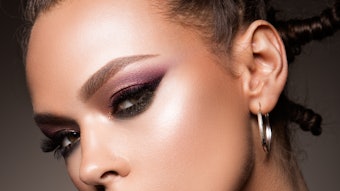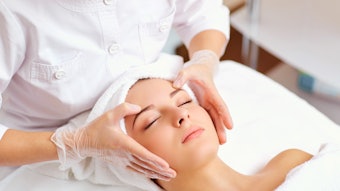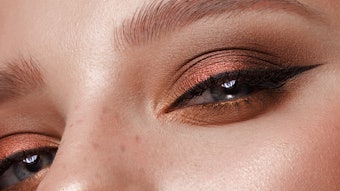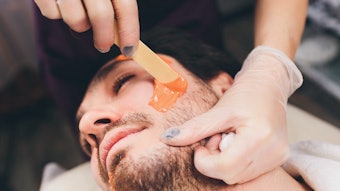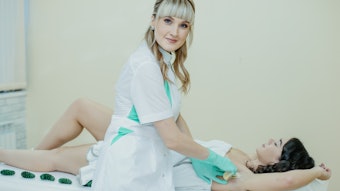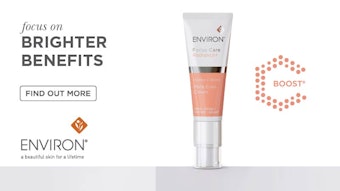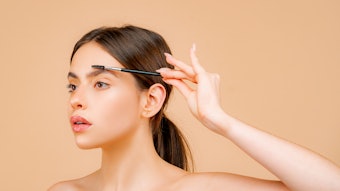
Every part of the body goes through changes during pregnancy, and the skin is no exception. Skin changes occur in about 90% of pregnant women in one form or another due to the surge of hormones.
Pregnancy glow is not a myth. Blood volume increases during pregnancy by almost 50%, so vascular changes such as flushing and inflammation are not surprising. The increased circulation of blood to the body’s tissues causes the cheeks to take on a blush-like appearance. This glow is produced by the blood vessels just below the skin’s surface. In addition to redness, sebaceous glands may produce increased secretions, giving the skin an oily sheen or shine.
Women who are pregnant may experience acne and hyperpigmentation–often for the first time. However, just because a baby is on the way, this does not mean Mom is ready to accept wrinkles, brown spots or breakouts.
Proceed With Caution
There are varying opinions and few medical studies when it comes to the safety of ingredients on pregnant women, as testing is controversial. Professional skin therapists need to be ready to adjust a client’s skin care and treatments according to pregnancy precautions and contraindications (like avoiding electrical modalities). By performing a thorough consultation and skin analysis, we can properly reevaluate the current skin care regimen and help the expectant mother safely achieve her skin care goals.
Here are a few safe and simple skin care guidelines to follow for the pregnant client.
Consult a doctor. Recommend that your client consults with her doctor prior to treatment and skin care product use if she is currently pregnant, nursing or considering pregnancy in the near future.
Caution in the first trimester. Be cautious with products and treatments if the client is in her first trimester and/or has experienced complications with her pregnancy or previous pregnancies.
Make them comfortable. Avoid any ingredients or treatments that make the client feel uncomfortable, even if approved.
Pregnancy is an exciting journey, but with it comes its own set of skin challenges and concerns. Expectant moms will have many questions—not only about how to keep their skin looking its best, but also how to care for their skin in safe ways for the baby. Be mindful of your client possibly beginning to place more focus on her facial appearance during pregnancy. She may not quite understand what is happening to her skin or why her favorite retinol wrinkle-remedy is no longer allowed.
Here are some of the most common skin changes during pregnancy, as well as a short list of ingredients considered safe and others to be avoided.
The Mask of Pregnancy
Melasma—or the mask of pregnancy—is the most common change associated with pregnancy. It is characterized by irregularly shaped light or dark brown patches of hyperpigmentation. According to studies, melasma (cholasma) affects nearly 70% of pregnant women.1 The hormonal combination of estrogen, progesterone and the melanocyte stimulating hormone (α-MSH) can cause the discoloration and darkening usually found on the chin, upper lip, cheeks and forehead.
Do Try. Melasma cannot be prevented, but intensity can be minimized using brightening serums, proper exfoliation and limiting exposure to ultraviolet light. For targeting those stubborn brown spots, reach for vitamin C, oligopeptides 34 and 51 and niacinamide. For safe exfoliation, use lactic acid to resurface and brighten the skin. Daily use of an SPF 30+ is a must. Physical sunscreens like titanium dioxide and zinc oxide tend to be preferred choices, as they reflect heat away from the skin—perfect for the pregnancy flushed face.
Don’t Apply. Avoid using hydroquinone during pregnancy. Studies have shown its topical use on humans is systemically absorbed.2 Although there is no current research regarding its actual use on pregnant women, due to its substantial absorption-rate, the risk of cellular toxicity is too great with this chemical whitener.
Psoriasis, Eczema, or Rosacea
Pregnancy can put the body under stress, which can be a trigger for your client if she is predisposed to psoriasis, eczema or rosacea. Symptoms can worsen for some, while conditions can improve for others during pregnancy. Reasons for this are unclear and it depends on the individual. One theory is, the immune system and cellular responses have now switched focus onto maintaining a healthy baby, leaving the mother more susceptible to flare-ups. Be aware of rashes, dry skin and general itchiness potentially coming and going during pregnancy; however, if it becomes severe, your client should seek advice from their doctor.
Do Try. Teach your client how to be kind to her skin during pregnancy and recommend a gentle skin care routine. Suggest mild gel/cream cleansers and products, containing calming and soothing ingredients like panthenol, bisabolol and red hogweed. Barrier-building ingredients such as oat kernel (Avena sativa), sunflower seed extract and borage seed oil reduce irritation. Opt for redness-relieving primers with conditioning silicones and a green tint to neutralize skin sensitivity.
 Don’t Apply. Avoid abrasive exfoliation or harsh scrubs both at home and in the treatment room. Both heat and friction may instigate inflammatory responses. The client should skip the hot showers and treatments should keep steam and heat (i.e. towels) to a minimum. Turn off the bed warmer and keep the client away from products containing artificial fragrances, which can further aggravate sensitized skin.
Don’t Apply. Avoid abrasive exfoliation or harsh scrubs both at home and in the treatment room. Both heat and friction may instigate inflammatory responses. The client should skip the hot showers and treatments should keep steam and heat (i.e. towels) to a minimum. Turn off the bed warmer and keep the client away from products containing artificial fragrances, which can further aggravate sensitized skin.Acne
The influx of the hormones progesterone, estrogen and other androgens during pregnancy can stimulate the sebaceous glands and the sweat glands, resulting in more perspiration and breakouts. With an increase in sebum, the skin becomes oilier, follicles are blocked and acne may appear on the face, and occasionally the chest and back. While some pregnant women celebrate their acne clearing up during pregnancy, others may experience an increase in the frequency and number of their lesions, especially if they have had acne before. Studies show hormone levels spike during the earliest stages of pregnancy and often again in the third trimester, which may explain the initial onset of hormonal breakouts and then another surge of acne until the baby is born.
Do Try. Keep the mother’s skin clear and shine-free by opting for oil-absorbing clays such as bentonite and kaolin and sebum-regulating niacinamide. Banish breakout causing bacteria with lactobacillus ferment, zinc gluconate and Spirea ulmaria extract. If pustules and papules are the challenge, some doctors approve low concentrations of benzoyl peroxide as a spot treatment. Lactic acid is a great alternative to salicylic acid to increase cellular turnover along with additional hydrating and brightening benefits. And while she is trying to fight the signs of aging, peptides can be safely used to stimulate collagen synthesis and firm the skin, while antioxidants fight free radical damage.
Don’t Apply High levels of salicylic acid are definitely a no-no. Even though studies have not been conducted on its effects topically with pregnant women, doctors anecdotally recommend that pregnant women should avoid using high concentrations of salicylic acid. However, small amounts of salicylic acid in a spot treatment or a wash-off product used once or twice a day is typically considered safe. Steer clear of products covering more areas or that sit for longer periods of time on the skin. Remember more product equals higher likelihood of absorption.
Lastly, retinoids are one of the skin care ingredients expectant moms should also avoid. These powerful substances help reduce wrinkles and improve skin tone, but some studies have shown high doses of vitamin A during pregnancy can be harmful to an unborn child. Avoid prescription retinoids and oral retinoids, which are known to cause birth defects and should not be taken. If you discover a pregnant client inadvertently has been using a skin care product containing retinol, inform her without causing panic. Have her immediately discontinue use of the product until after delivery and breastfeeding is complete.
Be Prepared
Becoming a new mother is challenging enough without having to navigate through a confusing maze of skin care ingredients and treatments. It is essential as professionals that we are prepared and educated to help make skin care during pregnancy a safe, comfortable and joyful experience.
REFERENCES
(Websites Accessed Dec 14, 2015)

